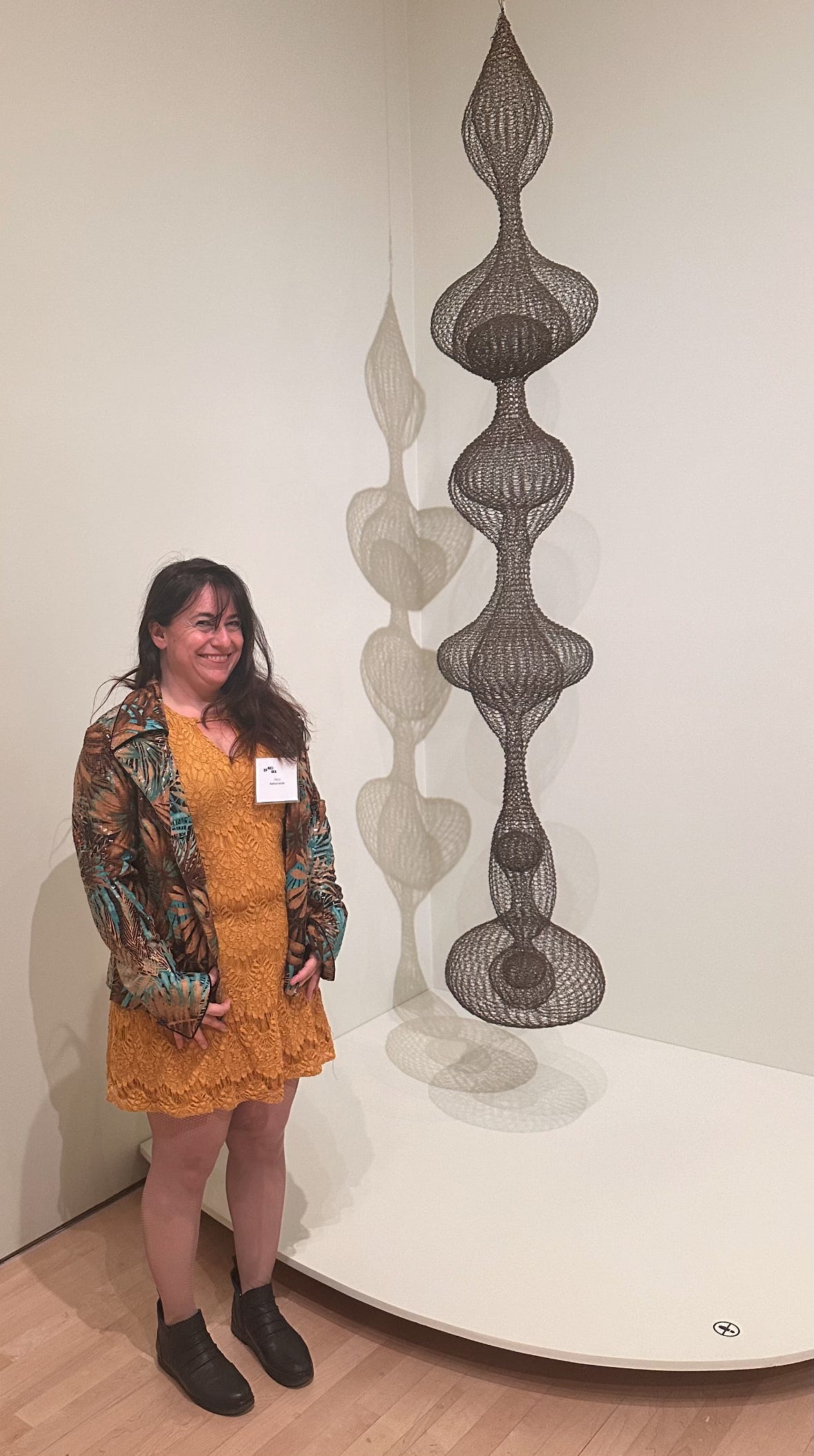I Love Writing, I Do, But Is Loving It Enough of a Reason to Keep Doing It For Money?
How the digital age erased the line between creativity and unpaid labor ... They love your words, but never enough to pay your bills ...
I’ve been thinking a lot about labor lately. What is labor? How do we value labor? I recently read an anthology edited by Matilda Bickers called Working It: Sex Workers on the Work of Sex, and I paused more than once at all of the different mentions of how “legitimate” work - social work, most commonly in these pages - but office work, other work was often equally or more monotonous, draining and disrespected as the sex work these authors had done.
And it got me thinking about writing as labor and how that has changed over the twenty years I’ve been doing it as a career. I’m working on a longer piece about this, continuing to mull it all over, looking back at what I believed writing was career-wise when I began, what it became, what it is now, what I want it to be. Here’s my initial thoughts on the page in rough draft as I work on this ….
On Labor, Value, and the Collapse of Creative Work
I’ve been writing professionally for over twenty years. I’ve published books with small presses, written essays that people tell me have made them cry, and developed content for institutions that could barely remember my name when the invoice came due. I have no savings account. No retirement fund to speak of. No salary history strong enough to bring to a loan officer with my current credit rating. Just a body of work. And the quiet exhaustion of watching that work lose value in real time.
I’ve been scrolling through job boards lately. Writing jobs, yes, but also seeing what other jobs I qualify for with my 20 year professional career and 1.5 Masters Degrees. The algorithm spits out these roles I’m supposedly qualified for: AI tutor. Customer service representative. Sex work, suggested not directly but implicitly, through whispered jokes and OnlyFans-era side hustle tips. These are not failures of my character or ambition. They are reflections of a system that cannot see writing as labor unless it’s advertising.
I spent years believing that if I worked hard enough, built a strong enough portfolio, and stayed on top of the shifting demands of digital publishing, I would earn a sustainable income. But the goalposts keep moving. Rates stagnate. Editorial budgets shrink. Pitches go unanswered for weeks, sometimes months. And when an opportunity finally comes through, it's often with a fraction of the compensation it once offered. The labor is the same. The value, somehow, is not.
Meanwhile, the stories that matter, the ones that demand nuance, care, time, are increasingly edged out by trend-chasing listicles, content marketing disguised as personal narrative, and the endless churn of "relatable" burnout. It is not that readers don’t care. It is that the infrastructure built to deliver writing to them does not reward care. It rewards speed, brevity, and mimicry.
The Disintegration of Meaning
I’ve written for established publications and ghostwritten wellness blogs. I’ve spent three days crafting a personal essay only to get paid half of what I made an hour pouring coffee twenty five years ago. I’ve interviewed artists about their trauma for branded content and been told to “lighten the tone” so it would be more “sponsor friendly.” I’ve been paid to train language models to write like me. The more convincing the machine gets, the less I am worth.
Writing, I was told, I believed (I believe?) is a calling. Something sacred. Something you’re supposed to “suffer” for. But lately, it feels less like a calling and more like a loop. A haunted one. I brand my own burnout, pitch my pain for page views, and write about healing while trying to figure out how I’ll pay for therapy.
In this landscape, personal narrative becomes content, not confession. Reflection becomes strategy. Even our vulnerability is optimized. There is no space for stillness, no margin for slowness. Every moment is an opportunity for engagement, and every emotion a potential click. The emotional labor once reserved for the page is now demanded by the algorithm.
And with each published piece, the labor intensifies. Writers must promote their work across multiple platforms, track metrics, respond to comments, and absorb both critique and indifference in equal measure. The act of writing becomes secondary to the act of staying visible. And visibility, in turn, becomes the only form of currency.
Fast Food, Sex Work, and Other Valid Professions
I have worked in daycares. I’ve waited tables. I’ve answered phones with a (sorta)smile while my rent sat unpaid. The difference between that labor and my current work is not in the difficulty, but in the respect assigned to it. Writing continues to be framed as noble … so noble, in fact, that we’re expected to do it for free. Fast food is framed as shameful, even when it’s more stable work, good enough only for teenagers and addicts with no other options. Sex work is demonized, even when it’s more honest about exchanging humanity for money.
All three (writing, food service, sex work) are forms of labor that demand presence, performance, and the sublimation of self. They rely on consistency, emotional regulation, and an ability to read people quickly. They require you to smile, even when you’re tired. Especially when you’re tired.
The parallels are more than metaphorical. All these jobs involve constant risk assessment: is this customer going to tip, or threaten? Is this editor going to accept the pitch, or ghost me? Is this subscriber going to pay, or just DM me at 2 a.m.? The skills honed in service and survival are the same ones deployed in supposedly creative careers.
And yet, the shame is distributed unevenly. It is more acceptable to post unpaid writing than to admit you took a shift waiting tables. More acceptable to offer your expertise for free in a webinar than to charge a fair rate for a cam session. The respectability politics of labor have less to do with effort or ethics than with optics. Whose labor is sanitized, and whose is seen as dirty.
Respectable Suffering
What varies is the social story we tell about them. We celebrate the writer but shame the waitress. We romanticize the starving artist but criminalize the survival of the sex worker. We call it “selling out” when a writer teaches AI how to replicate their tone, but we say nothing when corporate writers are paid to help tech startups disrupt empathy.
The work is not less real because it involves a laptop instead of a headset, or a headline instead of a shift schedule. The labor is not less labor because it is abstract. I’ve had to prove I was worthy of a byline more times than I’ve had to carry a tray full of drinks. Only one of those usually paid for a dentist appointment.
Respectable suffering is a cultural obsession. We admire those who struggle for art, but only if that “struggle” remains legible, polite, and ultimately triumphant. We don’t know what to do with the people who keep working, keep producing, and still can’t afford to get their teeth fixed. We want to believe that talent rises. But mostly, it just exhausts itself. (I mention getting my teeth fixed because in spite of a little bit of GoFundMe help, I’m still trying to pay off the Care Credit loan for dental work I had done pre-pandemic.
And while some of us burn out trying to make writing work, others burn through resources to keep the illusion alive. Family money, academic grants, inherited safety nets. The ecosystem that rewards respectable suffering is also one that quietly subsidizes it. The rest of us are left to hustle for crumbs and fight over crumbs that were never meant to feed us.
The System Is Not Broken. It’s Functioning As Designed.
If writing was once seen as sacred, it’s now been quietly commodified into oblivion. Meaning is disintegrating under the pressure of optimization. The voice becomes flatter. The essays shorter. The feedback is a soft corporate voice saying, “Make it cleaner. Make it simpler. Make it stop sounding like you.”
I love writing. I do. But love does not pay the rent. Love does not negotiate fair rates. Love does not protect you from an inbox full of rejections that arrive in the form of silence.
The content economy doesn’t reward voice. It rewards volume. The more we give, the more it asks. We write not for meaning, but for metrics. And when those metrics dip, we are reminded that our value is conditional. Conditional on engagement. Conditional on productivity. Conditional on disappearing into the tone.
This system isn’t broken. It was built this way. To extract. To flatten. To consume. Writers, like many other workers, are simply the latest in a long line of creatives asked to turn their lives into labor and call it gratitude. But we are not lucky to be here. We are surviving despite it.
The Future I’d Love to See
This isn’t just about writers. It’s about everyone who works in invisible economies, in care roles, in artistic fields, in the kinds of jobs that don't come with respect but do demand your soul. If we are serious about valuing labor, we need to reframe what counts as work, who gets to be called a professional, and what survival actually looks like.
We deserve more than applause for our passion. We deserve contracts, healthcare, time off, and rest. We deserve to not have to choose between creative fulfillment and financial ruin. We deserve a future where making art, telling stories, or teaching others to think isn’t just reserved for those who inherited trust funds or tenure.
Dignity cannot be an aesthetic. Labor cannot be a lifestyle. The future we deserve is one in which all work is seen, valued, and protected. Where people can create without fear, rest without guilt, and be compensated for what they build. The future I imagine is one where labor is not defined by suffering, but by its role in sustaining life and culture. A future where creative workers can rest. Where the value of a person’s work is not determined by how few people can afford to do it for free. A future where our contributions are not measured in likes, shares, or fleeting mentions, but in the depth of what we are allowed to make, and the freedom with which we are allowed to live.
This is not a fantasy. It is a necessary demand. It asks for policy, not platitudes. It asks for solidarity, not slogans. It asks that we recognize all forms of labor as part of a shared human project to sustain, nourish, and connect. That includes writing. That includes care. That includes sex work and food service and code-switching and everything in between.
We must build systems where writers can be paid without apology. Where creative practice is protected, not extracted. Where labor is not romanticized, but respected.
Until then, many of us will keep writing in the margins of our own careers, trying to make sense of our worth in a world that only values the work once it no longer sounds like us.
And continuing to find a way to publish what’s authentic for us - on Substack, in ‘zines - while begging other people exactly like us to find a way to pay for our words. I want to find a better system than this. I want to help create it.
Until then, I will continue piecing together a career from content writing and social media writing and grant writing and the occasionally-accepted freelance article. Because I have not ever failed at writing. Objectively, in so many ways I have succeeded. It is the system around writing as a career that has failed.
Are you in the unique position to pay to support the work writers are doing?










As I read this I thought about my ongoing saga of losing my housing at 68 years old, having worked in arts fields, mostly self-employed throughout my life. With a late in fife M.A. and health issues, no savings, no retirement funds but S.S. under 1K a month, I have one choice for housing - HUD senior housing. It's not ideal. I will have no space for my writing and photography desk. Thank you Kathryn for voicing the struggles of writers writing on a content platform.
What a powerful piece and a call to reason for all of us—creatives and beyond. You said it right: love is not enough, yet it is the fuel that keeps us alive. The system isn't built to support the arts as essential or masterful paths—it fails to elevate and secure them. The same imbalance applies to creative professions, while fields like business, tech, and politics are given a kind of armor, both philosophical and financial, that allows them to dominate—even though it's the arts that help them shine in the spotlight.
It’s ironic how our craft is losing its aura for commodity, even though so many of us have believed deeply in our gifts and talents. The market keeps screaming that belief isn't enough.
I hope a better system prevails—one where creatives have more influence and economic power to define both our worth and the true Value of Art. In the end, many are called, but few are chosen. I hope future generations won’t lose their soul by diluting themselves for lack of options, unable to fully own their craft. Politicians and philanthropists can help with legislation and funding, but we still have to reassess what is Value.